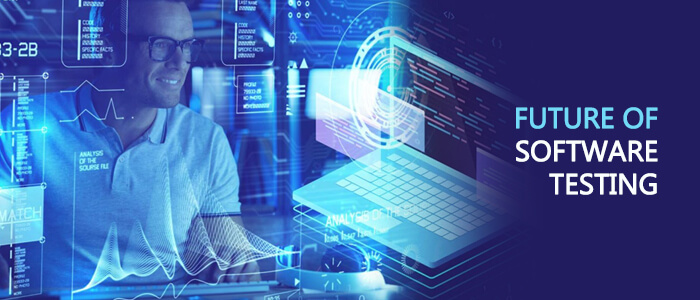
Software testing services now play a crucial part in the ever-changing world of technology, where innovation is the compass guiding enterprises. Previously, these services were limited to the edge of development and are now at the forefront of quality control and user happiness.
Software testing services are ready for a transformative journey as industries navigate the digital landscape. This excursion explores what lies ahead for software testing within the tapestry of new trends and predictive insights. The next period is both a problem and an opportunity, from the world of intelligent automation to the fortress of security and performance.
This blog navigates the intricate details of software testing services, unfurling the trends and predictions poised to define its trajectory.
Embracing AI and Automation
Incorporating Artificial Intelligence (AI) and automation into software testing processes is rapidly gaining ground as businesses aim for greater productivity and shorter release cycles. Intelligent test case development, predictive analysis, and anomaly detection are made possible by machine learning algorithms and AI-powered tools.
Automation eliminates human error and facilitates extensive testing scenarios, which speeds up the testing process and improves accuracy.
In adaptive testing, where the testing plan changes in response to the performance and user behaviour of the application, we may anticipate that AI will have a larger role in the future.
Moreover, the growth of AI-driven continuous testing will make real-time monitoring and evaluation possible, guaranteeing that apps continue to function flawlessly even after deployment.
Shift-Left Testing Approach
The "shift-left" paradigm is progressively replacing the conventional software testing method, which is frequently left until the end of the development process. With QA processes integrated from the project's beginning, this technique strongly emphasises early and continuous testing.
Organizations can detect and fix problems earlier, including testing at every stage from requirements gathering to coding and beyond, reducing the cost and effort required to fix them later.
In the future, shift-left testing and agile approaches will blend seamlessly to foster cooperation between QA and development teams. This method will result in shorter feedback loops, quicker bug fixes, and eventually a more efficient development cycle.
Focus on Security Testing
Security testing is no longer an afterthought; it is now a crucial need due to the rise in cyber threats and data breaches. The emphasis on security assessments, such as penetration testing, vulnerability scanning, and compliance validation, will grow in the future of software testing services.
Security testing will advance to include conventional apps, Internet of Things (IoT) devices, cloud-based services, and blockchain technologies as software applications become more linked and data-sensitive. Software testing services will work closely with cybersecurity professionals in this environment to ensure apps are protected against various potential attacks.
Performance Engineering and Testing
Performance engineering and testing are becoming more significant than ever in an age where users have tremendously high expectations for speed and responsiveness. In the future, performance testing will move from being a stand-alone process to being part of a holistic performance engineering process that starts with aspects like scalability, load balancing, and user experience improvement.
Tools for performance testing will advance in sophistication, enabling more accurate simulation of real-world usage scenarios. Performance testing will broaden to include network latency, data transfer speeds, and responsiveness across various platforms with the rise of edge computing and the complexity of applications.
The Surge of DevOps and Continuous Testing
Software testing services are about to change due to the cultural and technical movement known as DevOps, which aims to foster seamless communication between development and operations teams. Continuous testing is necessary for CI/CD pipelines, a key component of DevOps, to ensure that code changes don't negatively impact application functionality.
As developers take on additional testing duties and testers get more involved in the development process, the line between development and testing positions will become even more hazy. Faster releases, less conflict across teams, and better code quality will all result from this fusion.
Augmented Reality and Virtual Reality Testing
As augmented reality (AR) and virtual reality (VR) technologies become more prevalent, software testing services must adapt to this new frontier. AR and VR applications introduce unique challenges related to user experience, sensory immersion, and device compatibility.
Testing AR and VR applications will involve assessing factors like motion sickness, visual coherence, and seamless interaction with virtual objects. With the expansion of AR and VR in fields like gaming, healthcare, and education, specialized testing methodologies will emerge to ensure these applications meet user expectations.
Evolving Role of Manual Testing
Despite the rapid advancement of automated testing and AI, manual testing is still a crucial component of software testing services. Its function changes from routine, repetitive duties to more exploratory, usability-focused testing. Human testers will use their imagination, intuition, and user perspective to spot subtle problems that automated technologies might overlook.
In the future, human testers and automation developers will work closely to build test scenarios, confirm AI-generated findings, and offer vital user experience insights.
Conclusion
Software testing will continue to evolve through innovation, teamwork and adaptation. Software testing needs to advance as technology continues to change the world to guarantee that applications are reliable, fast, and easy to use. The landscape is ripe with opportunities for both organizations and testers, from integrating AI and automation to prioritizing security and performance. By embracing these trends, organizations will gain the confidence they need to handle the rapidly evolving digital landscape and superior software.
Software testing services are the unsung heroes in a world where software is the foundation of all sectors, ensuring dependability, quality, and customer pleasure. As we go out on our voyage into the future, it is abundantly evident that software testing is necessary and the builders of an excellently functioning digital world.



